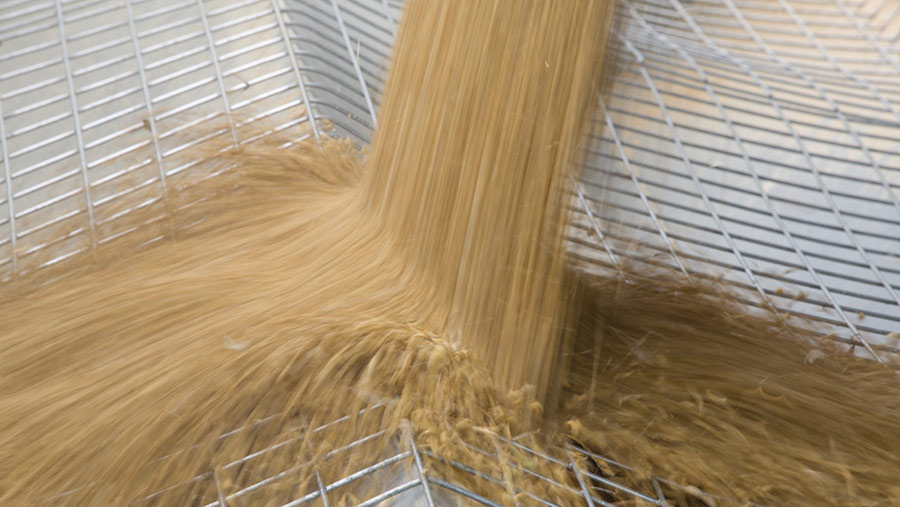Opinion: Singing the praises of central grain storage
 © Tim Scrivener
© Tim Scrivener Harvest is a season of irony. It derives pleasure from mocking optimism.
Be it joy from forecast dry weather interrupted by rain on the windscreen; a hum of contentment celebrating a combine’s reliability drowned out by a blockage alarm; or that fateful mental calculation:
“How long has it been since we last had a puncture on a grain trailer?”, just before that awful rumble of rubber without air.
See also: Tips to achieve successful long-term grain storage
Last week, while we had the rain that wasn’t forecast and the puncture on the grain trailer, I was drafting a Farmers Weekly opinion piece in my head. Succinctly, I was formulating the merits of central grain storage in a post-Agriculture Act world.
To my mind, the advantages are many, and anyone thinking about erecting a new grain store should consider it as an alternative.
Freeing up shed space and head space presents opportunities for diversification. And it avoids the perennial headache of trying to squeeze a quart into a pint pot, which in grain drying parlance is squeezing a 40t an hour combine through a 10t an hour drier.
We have been using a central store close to us for four years. The business is the model of efficiency and calm.
A phone call to arrange collection is met with a virtual smile, and a “we can sort it” response. We tip the grain on a concrete pad and it is collected almost on demand.
Grain is valued ex-store and can be traded in any position within that season. Of course, be it malting, milling or feed, then standards must be met – of course they must. It appears I forgot to digest this part…
Harvest 2021’s dark sense of humour was chuckling. Our hassle-free central storage, that frees up headspace, was giving me a headache.
The sunless July had taken its toll – especially on the oats. With no sunshine to fill the grains, they had failed to reach the minimum kilo weight required.
Looking forlorn, skinny and forsaken, they sat on a concrete pad, exposed to the elements, homeless.
I rationalised. If I can eat wonky carrots, surely chickens will eat my featherweight oats? The newswires were full of stories about food shortages.
Might someone be looking for some readily available floaty oats?
It was not to be. From hassle-free to hassle a-plenty, we hauled the oats to another store on our farm nearby. With a squash and a squeeze, we parked the problem for another day.
There are lessons to be learned from this experience. I stand by the merits of central storage. Regardless of your leanings, diesel-fired grain driers are not the future.
Firstly, we should focus on our strengths and interests. My skill set is more suited to growing a crop and renting shed space than drying, monitoring and storing grain.
Secondly, we don’t pay enough attention to our market. I should have assessed the kilo weight of the oats before we started combining.
The problem wouldn’t have gone away, but I would have been more prepared to deal with it.
And finally, perhaps most importantly, the central storage business is a pleasure to deal with. Aligning values of work ethic and customer service is important. Simply put, I like doing business with people I like.

